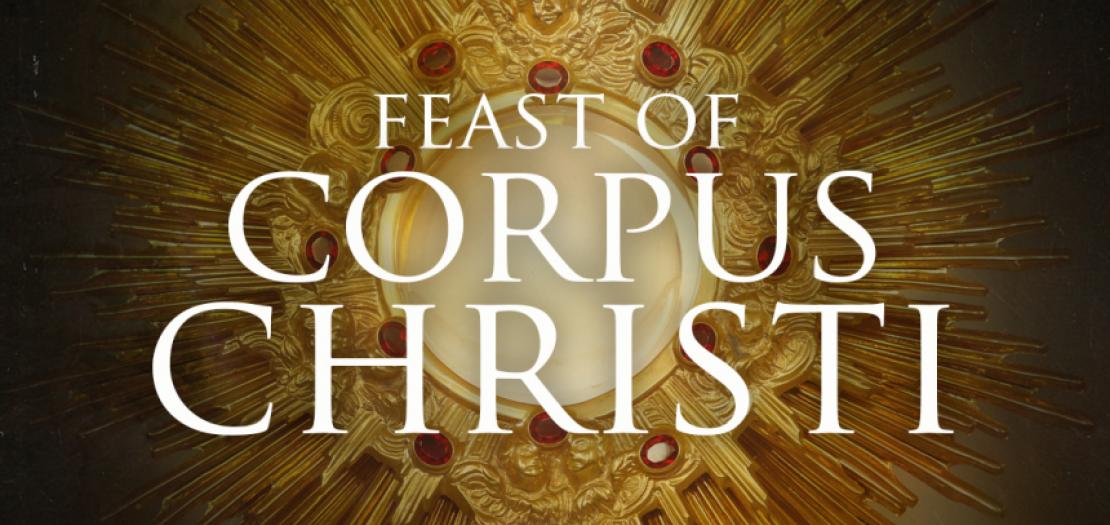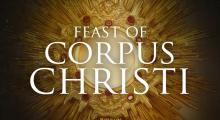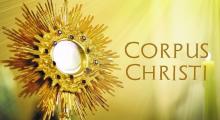Issued by the Catholic Center for Studies and Media - Jordan. Editor-in-chief Fr. Rif'at Bader - موقع أبونا abouna.org

Following is the text of Patriarch Pizzaballa's meditation marking Solemnity of Corpus Christi dated June 19, 2025:
For Jesus, the Eucharist is not just an event that took place at the Last Supper with his disciples, when he took the bread and wine and offered them to them as a sign of his life given.
For Jesus, the Eucharist is a style, a daily decision. It is his way of being, to the point where the Emmaus disciples recognize him at the moment when the Lord takes the bread and breaks it: their eyes are opened and from this gesture they return to him, to his identity (Luke 24:31, 35: “Then their eyes were opened and they recognized him... they had recognized him in the breaking of the bread”.
The Eucharist is therefore not an occasional event for Jesus, but a story, it is his story. If we wanted to express the story of Jesus in one word, we could use this one: Eucharist.
Jesus accepts our humanity, takes his life, his body into his hands. He recognizes it as a gift from the Father, does not keep it to himself at any point in his existence, but breaks it again and again and passes it on so that everyone can be filled with this offered life.
For this reason, the evangelists not only recount the Eucharist in the context of the Last Supper, but intersperse the Gospel with Eucharistic gestures, and on this solemnity of Corpus Christi, the Gospel passage gives us one such gesture.
After the apostles have returned from their mission, (Luke 9:10) Jesus withdraws with his own to a deserted place, but he is immediately followed by the crowd, who suspect his intention. Jesus welcomes them, talks to them about the Kingdom of God and heals their sick (“He received (the crowd) and took ... as many as were in need of healing”. (Luke 9:11) The passage very clearly emphasizes the destitute and needy situation of the crowd: the place is deserted, (Luke 9:12) the people are numerous (Lk 9:13-14), the available resources are far from sufficient (“We have only five loaves and two fish”. (Luke 9:13) and it is already evening. (Luke 9:12) There is a lack of life that man alone cannot remedy.
The solution the disciples propose is to send the people away (“Let the crowds go away to the villages and the countryside nearby”. (Lue 9:12)
The term the apostles use to ask Jesus to dismiss the crowd carries the root of the verb to dissolve and is the one that according to the ancient law husbands used to cast out their wives, to dissolve the bond that bound them. In the face of these people’s hunger, the only option seems to be to dissolve the bond, to break the covenant, to realize one's own inability to give life to all.
Jesus, on the other hand, not only does not break the covenant, but invites everyone to stand still, to make themselves comfortable, to stay (“Let them sit down in groups of about fifty”. (Luke 9:14)
For him, the way is different, and it is described by certain terms that we will also find again on the evening of the Last Supper (Luke 22:19): Jesus takes the loaves and fish, looks up to bless, then breaks the bread and gives it to the disciples.
These are four terms that must be understood in pairs because they speak of two movements, two attitudes.
First: Jesus takes and blesses.
This means that he takes our humanity upon himself, becomes fully human, lives everything that constitutes a human life. He takes his life, that is, he accepts it as a gift, he does not give it to himself, he receives it.
And then he blesses: he finds this life good, for which he thanks the Father and says good things about him.
Then there are the other two terms.
He breaks the bread so that it can reach everyone, so that everyone can receive some of it.
He breaks in order to give, because if the bread is not broken, it does not satisfy anyone.
Now, to make the Eucharist, you have to keep these two pairs of concepts together.
It is not enough just to take and bless: The gift would remain in our hands and would not reach anyone.
But it is also not enough to just break and give: If everything depends on our own strength, giving will soon come to an end and hunger will increase and people will have to look elsewhere.
If instead life is first taken and blessed, then broken and given, then the gift will not run out and there will be an abundance left over (“They all ate their fill and took the leftovers: twelve baskets”, (Luke 9:17) because that is what love is like, it is something that is not used up, that transcends, that goes on.
Everything that is taken, blessed, broken and given brings forth life, returns as abundance, and multiplies.
And it returns to the hands of the giver as a hundredfold that cannot be taken from him and remains for eternal life.
+ Pierbattista







